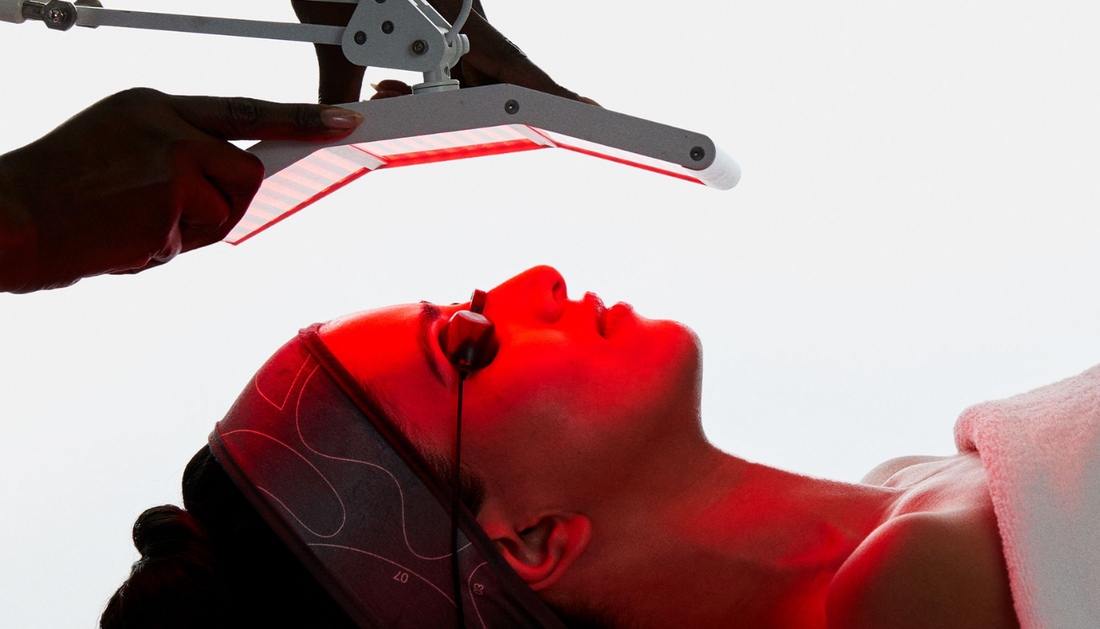Did you know that the benefits of LED light therapy were first discovered in outer space, with NASA astronauts using it to grow plants?
Fast forward a couple of decades and LED (or light-emitting diode) therapy has become incredibly popular, both in the professional treatment room and at home. And there’s many reasons why! It’s non-invasive, can treat multiple skin concerns and is often described as a deeply relaxing experience.
We’re going to deep dive into how LED works, the best LED light for your skin and how to get started with LED light therapy.
first of all, how does led work?
LED light therapy uses low-level, skin-safe, completely comfortable light to improve skin’s appearance. You can think of our skin using the LED light as an energy source, much like how plants use sunlight during photosynthesis.
There are a number of different LED colours to choose from, which are determined by the wavelength of the light. Each colour targets a different part of the skin, producing a specific skin benefit…more on this to come.
is led light safe?
Unlike other types of light therapy, LEDs are safe for regular use on all skin tones and types because they don’t contain ultraviolet (UV) rays. However, those with an active skin rash or taking prescription Vitamin A or medication for acne should avoid LED light therapy, as skin can become more sensitive to light.
Along with being considered a safe form of light therapy, another draw card of LED is that there’s no discomfort or downtime for the skin.
what skin conditions will benefit from led?
Every skin will benefit from LED light therapy – there’s no exclusions! As mentioned, different LED colours enter the skin at distinctive depths to target a variety of skin conditions. The two most popular LED lights, and those most researched and tested, are red and blue light therapy.
Red light therapy reaches down into the dermis of our skin, where collegian and elastin are made. As a result, this light therapy is often used to address signs of premature skin ageing. Red LED light therapy acts like an energy booster for the collagen and elastin factory deep in our skin, leading to a smoother skin texture with a reduced appearance of fine lines and wrinkles.
We’ve recently created a specialised PRO masque for our professional skin therapists to use in conjunction with Red LED - Light Energy Masque. This high-tech masque features advanced ingredients that help amplify the effects of red light therapy faster than light energy alone.
Red LED light is also thought to reduce inflammation while improving circulation, which can give skin a healthier glow.
Blue light therapy is a go-to, proven treatment for acne. Blue LED helps address breakout prone skin by killing off acne bacteria, slowing oil production and increasing hydration. With better hydration levels, this in turn helps balance oil production, whilst promoting skin healing. Another reason blue LED light therapy is ideal for clearing breakouts is because it doesn’t require any physical stimulation on the skin, plus it’s relaxing nature can help reduce stress levels, which is a leading cause of acne.
Other popular LED colours used by professional skin therapists are green and yellow. Green light therapy is used to help fade dark spots and even skin tone, as it targets the skin cell responsible for producing pigment, which is working overdrive when we experience pigment challenges. Whereas yellow light therapy improves circulation and boosts toxin removal, helping calm and reduce inflammation, making it beneficial for sensitive skins or those that experience skin disorders such as eczema, psoriasis and rosacea.
how many led treatments do I need to see results?
There is no set answer as it will depend on the type of machine being used i.e., professional/medical or an at-home device, plus the individual skin being treated! Results will come overtime - it’s recommended to have a course of professional LED light therapy treatments if you’re addressing stubborn skin challenges such as acne. A professional skin therapist can advise on a bespoke treatment plan for your skin and goals. In terms of frequency, you can generally have LED light therapy treatments on a weekly basis. With at-home LED devices, these would be used more regularly for best results.
what’s the difference between professional light therapy and home devices?
Put simply, it comes down to the power of the light therapy device. A qualified skin therapist is accredited to use a more advanced light therapy machine that will drive greater results faster. What’s more, it’s likely professional skincare will be applied to your skin during an LED treatment for enhanced skin benefits – this could be a potent serum and/or hydrating masque, or even Dermalogica’s Light Energy Masque, which has been specifically designed to be used with, and amplify, red light LED therapy. Using an at-home device can help enhance and complement professional LED light therapy treatments.
does dermalogica offer led light therapy?
Many of our professional skin therapists offer LED light therapy. Our approach to skin is one of personalisation. Therefore, if your skin will benefit from LED light therapy, we’d advise this is incorporated into your professional skin treatment. To find your nearest Dermalogica professional skin therapist, visit our store locator here.

